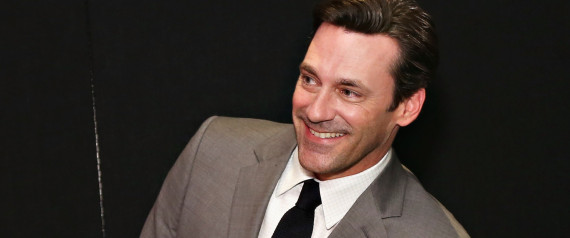 from Huffington Post
from Huffington Post“What is happiness? It’s a moment before you need more happiness,” he said a couple of seasons ago.
Philosopher Don realized that as we currently define it, happiness can be fleeting and ephemeral. When Don (played by the happier Jon Hamm) strolls out of a diner with his arms around two obviously-eager women, he may feel momentarily happy, but he is sure to be melancholy by morning. Or as a teenager in the show put it in a previous season, “Everything you think is going to make you happy just turns to crap.”
Aristotle came up with the formulation that “happiness depends on ourselves.” No outside event is going to do it. Psychologist have figured out that we get used to the good things that happen and they become our baseline expectation — at which point we need more and more. Per Don’s formulation, one moment of happiness just demands another.
But there is a deeper, more lasting happiness we can find — and that turns out to be gratitude. Whether you’re hanging out on Madison Avenue in the 1960s, in ancient Greece with Aristotle, or anywhere in the world right now, some good things will happen and some not so good. Your general sense of well-being depends on the perspective you bring.
For my new book The Gratitude Diaries, I spent a whole year living gratefully and I began to understand Aristotle’s idea that “happiness depends on ourselves.” More and more research proves that how we frame an event affects our emotional state. The ability to look on the bright side and find the positive can get you through tough times without giving up. And it can make the ordinary feel terrific.
So if Don Draper really wants to end the era on a high note, he can change his attitude and find some gratitude. Here are some steps:
1. Be More Grateful at Home
Our Don has messed up two marriages, but he can be grateful for the three children in his life. His oldest daughter Sally sometimes tests her limits (and his), but what teenager doesn’t? Being grateful for our kids means appreciating them for who they are right now. Parents often complain that their kids don’t say thanks for all that’s given to them, but gratitude works both ways. Kids who feel appreciated by their parents are more likely to develop a grateful attitude themselves. If Don let Sally know he feels lucky to have such a great daughter, she may ease up on some of the snark.
2. Say Thanks at Work
In an earlier season, rising advertising star Peggy left the agency that had given her a start and went to work for a competitor. “You never say thank you,” she told Don at one meeting. And he snapped back, “That’s what the money is for.”
Don got that one wrong. People want to be appreciated at work. They deserve to be appreciated. Bosses don’t rise in an organization by withholding thanks. Good employees like Peggy go where they will be appreciated and they are loyal to bosses who say thanks with more than a paycheck. Gratitude doesn’t sap strength — it makes a boss more powerful.
3. Keep a Gratitude List
Don remembers a lot of bad things from his past–but how about the good stuff? Writing down just one item every evening that made you grateful can change your perspective on the day, the year, or maybe your whole life.
Studies have found that keeping a gratitude list or journal lowers stress and depression and helps you sleep better. Don could use all of that. And it wouldn’t be surprising to have Don Draper–or anyone else–realize the importance of gratitude. I’ve had people from cab drivers to computer programmers tell me that they keep gratitude journals. I do it, too. Sometimes I write about an important event. Other times I’m just grateful that we have a few episodes left of Mad Men.
